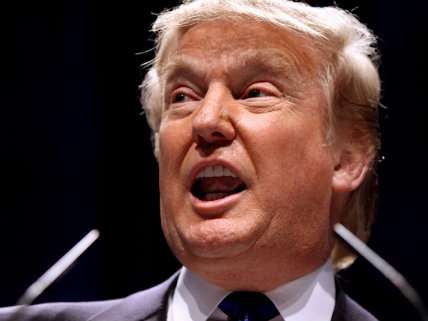After Orlando, Donald Trump Hints That President Obama Might Be Linked to Radical Islam
Trump is once again indulging in paranoid conspiracy theories about the president's background.

In an interview with Fox News this morning following yesterday's attack in Orlando, Donald Trump repeatedly hinted that President Obama might be connected or sympathetic to radical Muslim terrorists. It is the latest evidence that Trump is either a paranoid conspiracy theory himself, or is willing to exploit hate and paranoia for his own personal gain.
"Obama doesn't get it. Or he gets it better than anyone understands. It's one or the other. And either one is unacceptable," Trump said on Fox and Friends.
"Look, we're led by a man that either is not tough, not smart, or he's got something else in mind," Trump said during the same interview, reports The Washington Post. "And the something else in mind -- you know, people can't believe it. People cannot, they cannot believe that President Obama is acting the way he acts and can't even mention the words 'radical Islamic terrorism.' There's something going on. It's inconceivable. There's something going on."
Something else in mind. Something going on. It's inconceivable. He gets it better than anyone understands.
This is the sort of language that Trump uses when he wants to seed an idea that cannot be stated directly. It allows him a measure of deniability later on, even while sending a clear signal to supporters inclined to listen.
And the signal that Trump is sending here is that President Obama is somehow connected with or inherently sympathetic to jihadists.
No, Trump is not explicitly saying that Obama has some sort of a link to Islamic extremists, but he is implicitly raising the possibility, drawing on lingering fears especially amongst GOP voters, that Obama is himself a Muslim. As recently as last September, 43 percent of voters said in a poll conducted by CNN that they believed President Obama was a Muslim; in a separate poll that same month, 54 percent of Republicans said the same.
Trump himself has helped stoke those fears for years with his own high-profile remarks about President Obama's birth certificate.
In 2011, he made a public announcement that he would be conducting an investigation into the question of whether the president was really born in the United States, sending investigators to Hawaii, where Obama was born, to look for (presumably contrary) evidence.
"I don't know. I really don't know," Trump told CNN when asked whether Obama was born in the United States. At the time, Trump told Fox News that Obama "doesn't have a birth certificate. He may have one, but there's something on that, maybe religion, maybe it says he is a Muslim. I don't know. Maybe he doesn't want that."
I don't know. Maybe religion. Something on that.
Trump's hedged language and convoluted speaking style allow him to maintain the pretense that he is just raising questions, just following the facts to whatever conclusions they might reveal, even while raising dark possibilities that owe more to the plots of low-rent thrillers than to the mundane realities of American politics. He followed a similar course earlier this year when asked about the possibility that Supreme Court Justice Antonin Scalia might have been murdered, saying, "they say they found the pillow on his face, which is a pretty unusual place to find a pillow. I can't give you an answer." Trump has also appeared on the radio of prominent conspiracy theorist Alex Jones, and, at the end of the GOP primary race, suggested a link between rival candidate Ted Cruz's father and the assassination of President John F. Kennedy.
Given how frequently Trump indulges in this sort of brazenly paranoid rhetoric, it is difficult to avoid the conclusion that he either believes much of this nonsense himself, or he is cynically and deliberately spreading hate and false information in order to service his own image and agenda. As Trump might say, it's one or the other—and either one is unacceptable.


Show Comments (315)